Opinion
77 Years of Freedom from Maharaja –a Historical Perspective of Shaping of Current Dispensation of Gilgit-Baltistan
Published
1 year agoon
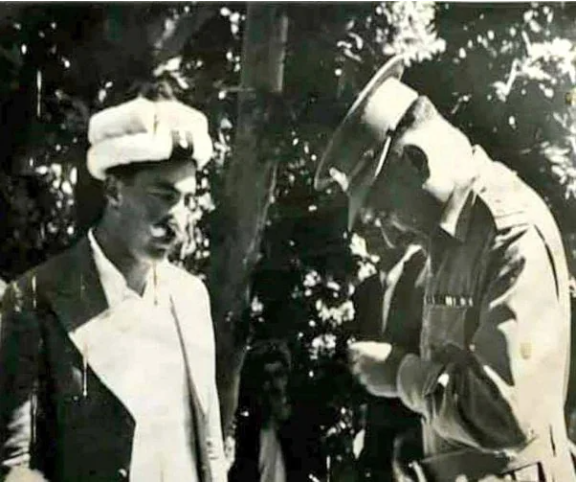
THE ADMINISTRATION of Gilgit-Baltistan covering 72971 square kilometers has always been a matter of interest due to its geo-political and strategic location. (Ershad Mahmud 2007) The region shares borders with China in the north, India in the east, Afghanistan in west province of Khyber Pakhtunkhwa (KP) in south. Its vast mountainous terrain and sparse population have always posed challenges to administer the region to the satisfaction of the populace. Various administrative reforms have been introduced since 1947 and the Self-Governance Order-2009 is considered a milestone towards empowerment making the region an administrative province with devolution of considerable powers to a legislative assembly in the form of a legislative list under article 47 (2) (b) of Self-Governance Order-2009. This order created two forums of legislation namely the Gilgit-Baltistan Assembly and Gilgit-Baltistan Council with the division of powers between the two currently GB is being governed under Governance Order 2018 wherein GB assembly has been empowered on the pattern of 18th Amendments like rest of provinces and GB council has become only an advisory body.
People of GB are commemorating their 77th Independence Day in memory of their liberation from yokes of maharaja Hari Sing. They proudly maintain that they acceded with Pakistan after sixteen days of their independence out of the fervor for greater Muslim state which had come into existence to the south of their territory in name of Pakistan under the dynamic leadership of the Quaid-e-Azam Muhammad Ali Jinnah just two and half months ago on August 14, 1947. They hoisted the flag of Pakistan and till then they are eagerly waiting for full integration with Pakistan -a dream, which was snatched by Indian hegemonic design when it took the matter to the UN and made GB part of Kashmir dispute, the people who know the history of GB and international law, are well aware of the fact that the whole GB as it exist today had never been integral part of state of Kashmir.rather.Diamar had its own tribal dispensation,punial,ishkoman,gupis and, Yasin had status of governorates in Gilgit Agency while Hunza and Nagar were princely states by all definitions which were made tributaries to a stronger state of Kashmir after 1892 Anglo-Brusho war at Nilt fort in Nagar State, a joint defense was gathered against the combined forces of Britishers and Maharaja of Kashmir. As per international law when the suzerain withdraws the suzerainty, vassal states regain their sovereignty and it is their discretion to accede with any state or exist as independent states. the accession deeds of the rulers of independent states of Hunza and Nagar are testimony for their allegiance and accession with Pakistan under international law. The original accession deeds of Hunza and Nagar state with Pakistan were in custody of major brown which were handed over by his wife to Pakistan upon death of major brown in 1990s.
In a public statement in a rally held in capital Gilgit on 27 October 2023 marking illegal accession of Mahataja against the will of people and subsequent occupation of j &k by Indian forces, as Black Day in history of subcontinent, the current governor and former chief minister of Gilgit Baltistan, Syed Mehdi Shah chanted slogans of long live Pakistan long live Pak Army. He said,” time has come to take practical steps and grant GB constitutional status. Moody has unlawfully annexed IIOK, people of GB are pro Pakistan and will remain so in future also. People of GB have always stood by the people of IOK. Modi’s claim on GB is false and ridiculous., we have got freedom from them (Maharaja) and acceded to Pakistan with our will, the UN should implement its resolutions on Kashmir”.
The Indian writer Pyranka Singh quotes an excerpt from a book written by Indian co-authors, wherein GB has been mentioned:
“We need to gradually turn the spotlight on Pakistan-Occupied-Kashmir, Gilgit and Baltistan. Our quest for a Line of Control (LoC) based solution for J&K has led to the progressive neglect of our claims on these areas. This now works to our disadvantage because the LoC is seen as the starting point and an eventual compromise is envisioned in terms of an LoC plus solution. Reasserting our claims and concerns will not only be a sensible declaratory posture. It will also help counter Pakistan’s claims about J&K being the ‘core concern’. We should formulate and execute a media plan which puts the problems in these areas continuously in the focus, and place the issue on the agenda of India-Pakistan talks…” [1]
So this is the hegemonic and neo imperialistic overtures of Indian elite and their think tanks who are pursuing the dream of Mahabharata enthused with hindutua doctrines. The unequivocal stance of people of Gilgit-Baltistan has been well expressed by the German scholar sokefeld in his book Locating Gilgit-Baltistan wherein he maintains that Gilgit-Baltistan is not part of Jammu and Kashmir but only of the Kashmir dispute. This contention shows that the area was disputed already in British colonial times, and the aspirations of natives of GB to become a constitutional part of Pakistan have not yet been fulfilled.
As far as the circumstances that led to ousting of Maharaja’s appointed governor Gansara Sing is concerned, it is necessary to keep young generations aware of the ground realities as they existed at the time of partition and subsequent ripple effect on surroundings including princely states as the 3rd June plan and partition act of 1947 had categorically enshrined that the princely state are at liberty to accede to either dominion or remain as independent states on their own. The real ruler of Gilgit agency was the viceroy through its political agent stationed at Gilgit. The political agent used to govern the agency through durbar style and jalsa model of governance. This style of governance had three kinds of interventions namely political durbar, intimate consultative durbar with chiefs in consultation on important matters and sports durbar. This is the reason till recent history the polo festival was used to be termed as jalsa not tournament or festivals as these are new terminologies for war sport polo.[2]
Referring to the ground realities of agency, in those days the writer of the scholarly article Three Forgotten Accessions: Gilgit, Hunza and Nagar, in the introduction narrates an eye opener incident. He says,” In November1947, there was only one flag pole in South Asia where the Union Flag still fluttered. This was at the mountainous post of Kalandarchi in the Gilgit Agency where Subedar Jamshed Khan, an ardent imperialist, could not bear the transfer of the agency to Kashmiri hands and refused to obey the orders of his superiors to replace the Union Flag with the Jammu and Kashmir state flag. The flag was eventually replaced by that of Pakistan only in the first week of November1947[3].”
If the origin and subsequent freedom of Gilgit agency understood the freedom of present-day GB can be grasped to a greater extent. Gilgit agency was established by the Britishers in 1889 to which states of Hunza and Nagar were linked but not integral parts of agency till 1892 Anglo British war at nilt fort Nagar for thirteen days fierce battle; after defeat of 1892 war the states Hunza and Nagar were made vassal states of Kashmir by the Britishers and these states used to offer tribute to Kashmir darbar under Dy-archly of Britishers and Kashmir, the former were responsible for defense this suzerainty came to an end when the Britishers took Gilgit agency in 1935 from maharaja for sixty years .similarly Hunza, Nagar and Gilgit were beyond control of Kashmir darbar under treaty of Amritsar 1846[4]. Gilgit agency was expanded in 1935 by adding Gilgit wazarat which was leased from maharaja for sixty years. When the British political agent handed over the administration of Gilgit agency to maharaja Kashmir on 1st august 1947 unexpectedly for locals but as a pre-planned move ordered by lord Mountbatten. This development raised resentment in populace as well as scouts and the rulers of Hunza and Nagar were also unhappy with this arrangement. Thus the first deal which was unacceptable to the inhabitants of Gilgit agency was this abrupt transfer of power to maharaja .Further situation deteriorated with the accession of Maharaja to India on 27th October which proved a turning point when Gilgit scouts and the rulers of Hunza and Nagar made their minds to maneuvering to consolidate their resources against Gansara Sing the newly appointed governor of Gilgit agency .Since much of Gilgit scouts comprised Hunza and Nagar jawans and NCOs whose mainly control was in hands of NCOs,Capt Bababr Khan and Shah Khan who were also close relatives of both rulers of Hunza and Nagar,started to plan under leadership of capt Babar khan to oust Gansara Sing through a strategic coup d’ete on the night of 31st October 1947 and on the 1st November the dream of liberation was materialized with the help of locals making the governor a prisoner of war. The rest of the area was liberated with the support of col khan of 6 Kashmir infantry and col Ehsan, Baltistan could be liberated after strenuous fighting only on August 14 ,1948 one year later than Gilgit agency.
Keeping in view the geopolitical importance of Gilgit-Baltistan it would be in the interest of the Islamic Republic of Pakistan, and people of Gilgit-Baltistan, to grant provisional provincial status by introducing necessary amendment irrelevant articles of the constitution of the Islamic Republic of Pakistan to the effect that, Gilgit-Baltistan is part of Pakistan unless the final fate of GB is decided through a plebiscite under the auspices of the United Nations as envisaged in security council resolutions in the context of Kashmir dispute.
[1] Gilgit Baltistan Between Hope and Despair
[2] Himalayan and central Asian studies—– volume 17 No 1 January to March 2013
[3] Three forgotten accessions gilgit, hunza and nagar(the journal of imperial and common wealth history volume 38 no 01 march 2010 ,pp. 117- 143)
[4] Ibid
About Author
Zakir Hussain
The writer is a civil servant in Gilgit-Baltistan, currently a staff member at the Soni Jawari Center for Public Policy in Gilgit. Reachable on e-mail: hzakir706@gmail.com
You may like
-
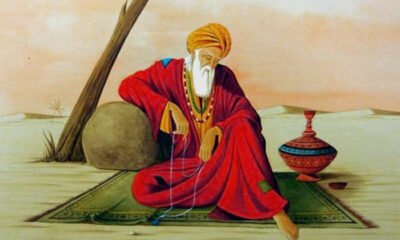

Rumi, the Moral Psychologist
-
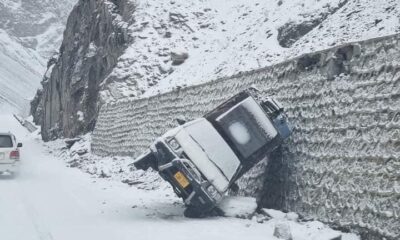

Poor Winter Maintenance of KKH Risks CPEC All-Weather Trade
-
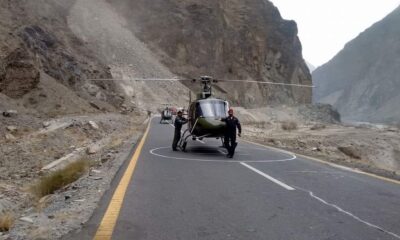

Pakistan Army Launches Rescue Operation, Missing Passengers in Deosai Found Safe
-
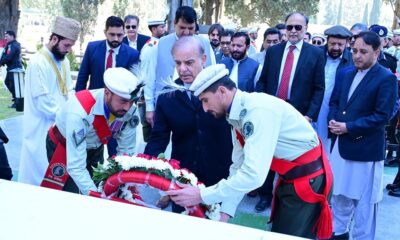

PM Shehbaz Sharif Visits Gilgit-Baltistan, Honors Martyrs, and Launches Development Projects
-
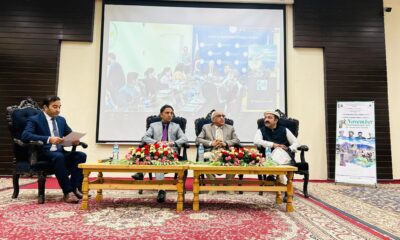

CISS-KIU Seminar: A Tribute to Gilgit-Baltistan’s Freedom Fighters of 1947
-
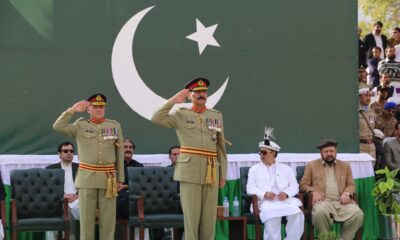

Gilgit-Baltistan Marks 77th Liberation Day from Dogra Rule
Arts, Culture & Heritage
Rumi, the Moral Psychologist
Published
1 year agoon
January 14, 2025By
Zameer Abbas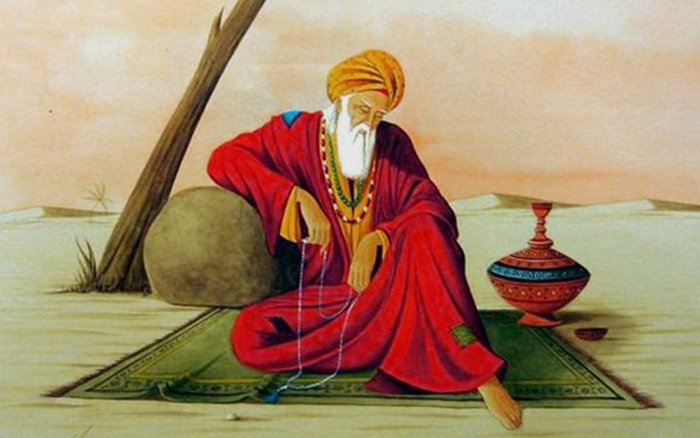
Maulana Jalal-ud-Din Mohammad (1207-1273), popularly known as Rumi, was a Muslim theologian-turned-poet. His poetry, published in two genres of masnavi and ghazal is mainly focused on the idea of love and its relation to the intimacy with God. However, the thoughts of Rumi, expressed through thousands of verses and ghazals, go beyond love and touch upon various aspects of human life and the universe. Even a cursory reading of Rumi’s poetry reveals his wide-ranging and thoughtful expressions on nature, universe, world, anger, lust, justice, purity, etc. According to Ahmed Javed, a contemporary literary critic, Rumi is the best author of human experience in the world. In other words, Rumi best describes the meaning of being a human on planet earth. Alan Williams, professor of Iraninan studies and translator of the works of Rumi, has identified the voice of moral reflection or homily as one of the seven voices while defining the narrative structure of Masnavi, a long poem by Rumi published in 06 volumes. Similar vein of advice and observations on moral psychology can be found in over 3,000 ghazals of Divan or Divan-e- Shams, the collection of ghazals by Rumi. Brittanica, an online encyclopedia, defines moral psychology as “the empirical and conceptual study of moral judgement, motivation and development”. This article details the verses of Rumi, from both Masnavi and Divan, which convey the deep observations of the poet regarding moral psychology. The verses are easily discernible for enduring reliability.
Like other poets, Rumi deploys the tropes of allegory, metaphor, simile, folklore, historical events, personalities, Quranic verses, Hadith etc to make his point. I will present a selection of verses from Rumi’s Masnavi and Divan highlighting the moral psychology therein.
این جہان کوہ است و فعل ما ندا
سوئ ما آید نداہا راصدا
(M I:215)
This world is the mountain, and our action the shout: the echo of the shouts comes (back) to us.
Rumi has explained the recompense for deeds and misdeeds by comparing the whole world to a mountain. Just like the mountain returns the schists by echoing it, the good and bad deeds are accordingly rewarded in this world.
Rumi’s places a lot of emphasis on the importance of thoughts in the life of a human being. He considers that a human being is nothing but a thought itself.
ای برادر تو همان اندیشه ای
ما بقی خود استخوان و ریشه ای
گر گُل است اندیشه ای تو گُلشنی
ور بوُد خاری تو هیمه گُلخنی
Brother! Your worth is in your thoughts alone; you are blood and flesh apart from that
You are rose, if all your thoughts are selfless
If bitter, you are a thorn that is judged worthless
Brother, your worth is in your thoughts alone
M II, 277-278
The formidable effect of a person’s thoughts are highlighted in the above verses. The precursor of every action is a thought. In a sense Rumi is ahead of René Descartes (1596–1650), French philosopher, by three hundred years who affirmed cogito ergo sum ( think therefore I am!). In other words, the ability to think and perceive constituted the most important element of human existence. At many places in both Masnavi and Divan Rumi elucidates how negative thoughts disempower and depress a human being and how he can rise above those thought processes. In the opening verse of Ghazal 2500 of Divan, Rumi diagnosed that the doom and gloom is always characterised by mean thoughts of a man:
چه افسردی در آن گوشه چرا تو هم نمیگردی
مگر تو فکر منحوسی که جز بر غم نمیگرد
Why are you depressed and cornered instead of moving ahead?
But then you are an epitome of mean thought and you are obsessed over grief
In numerous verses, Rumi emphasises the layered and unfathomable inner world of a human being, making it all the more important to avoid judging someone through appearances alone. An example:
َمرد را صد سال عم و خال او
یک سر ُمویی نہ ِبیند حال اُو
A man’s paternal and maternal uncles (may see him) for a hundred years, and of his (inward) state not see (so much as) the tip of a hair (M:3, 4249)
Rumi underlines the complexity of human psyche in that it is characterised by an inner world which is rarely apparent. In other words, he implies that our judgements based on the outward appearances or behaviour of a person may well be wrong considering that appearances never represent the human being on the whole.
Regarding worldly gains and glory, Rumi maintains that on the one hand they uplift and increase a person’s standing among the people but conversely they become the reason of the downfall too as succinctly expressed in the verse below:
دشمنِ طاؤس آمد پر اُو
ای بسی شہ را بکشتہ فر اُو
The peacock’s plumage is its enemy: O many the king who hath been slain by his magnificence!
(M1:208)
Rumi is of the view that by reciprocating a bad deed, one becomes equal to the perpetrator of the act. He, therefore, exhorts restraint or better still good behaviour in response to treatment.
گر فراق بندہ از بد بندھگی است
چون تو با بد بندگی پس فرق چیستHave I deserved my fate for some offence; If you hurt sinners what’s the difference?(M:1,1564)
It can be discerned from the above selection that besides numerous themes in his collection of verses (in Masnavi and Divan) Rumi conveys a message of morality in unmatched eloquence and clarity. Perhaps it is beauty and depth and a sense of wonder in these verses that remain relevant to date and keeps guiding anyone who immerses in the ocean of his wisdom.
About Author
Zameer Abbas
The author is an alumnus of the Institute of Development Studies, UK. He is currently associated with the government of Gilgit-Baltistan and tweets at @zameer_abbas21.
CPEC
Poor Winter Maintenance of KKH Risks CPEC All-Weather Trade
Published
1 year agoon
November 20, 2024By
Imran Ali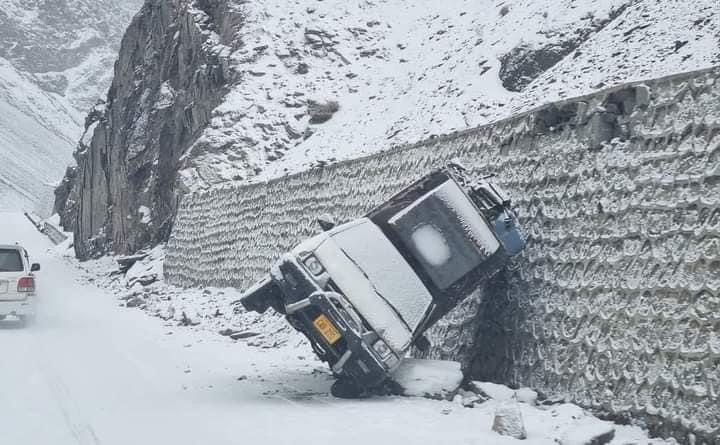
The Karakoram Highway (KKH), a vital lifeline for trade between Pakistan and China under the China-Pakistan Economic Corridor (CPEC), faces critical challenges each winter due to negligent maintenance. Connecting the two nations through the Khunjerab Pass—at over 4,693 meters (15,397 feet) above sea level—this strategic route is central to trade and regional economic integration. The pass connects Gilgit-Baltistan with China’s Xinjiang region and was reopened after closing for almost three years in April 2023. The land border was closed in 2020 after the outbreak of COVID-19. However, when heavy snowfalls hit, KKH becomes treacherous, risking the disruption of trade and the economic ties vital to both countries.
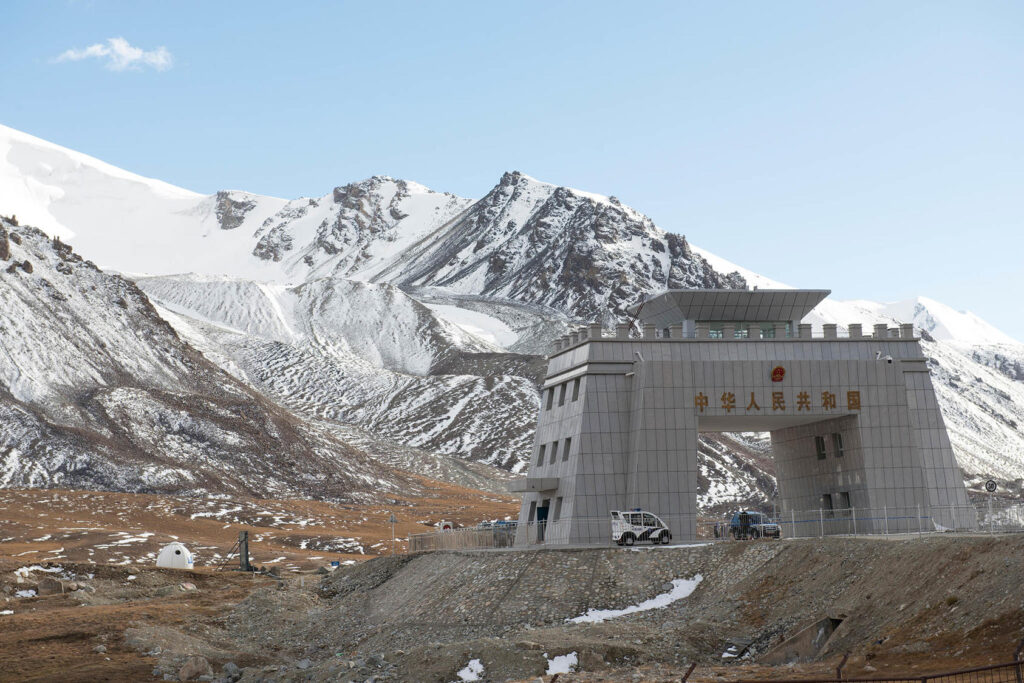
The KKH, a pivotal component of CPEC, facilitates the movement of goods and strengthens economic ties between Pakistan and China. Its year-round functionality is crucial for trade. Yet, the lack of timely snow clearance and road maintenance is disrupting the route, undermining the goals of CPEC.
Despite past agreements aimed at transforming the KKH into an all-weather route, meaningful execution has been lacking. This year, authorities have announced plans to finally implement measures to ensure year-round connectivity. However, the existing state of road maintenance raises doubts about their effectiveness and commitment.
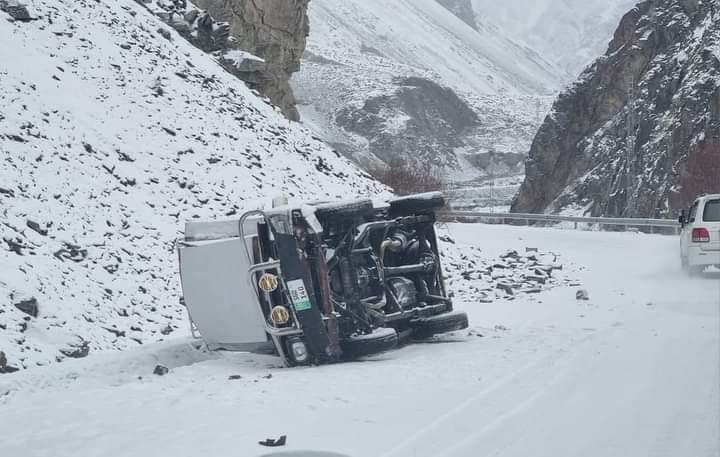
For Aman Ullah, a resident and trader from Gojal, Hunza, the snowbound Karakoram Highway is more than just an inconvenience—it’s a daily struggle that threatens his livelihood. “We are often left stranded for days, with no way to continue our trade,” he shared with The Karakoram.
Aman explained, “A few years ago, the Chinese government donated four state-of-the-art snow-clearing machines to the FWO for winter maintenance of the Khunjerab Border and nearby sections of the KKH. These advanced machines, equipped with computerized systems, were intended to ensure safe travel and uninterrupted trade. However, only one of these machines remains operational today, and even that is reportedly in poor condition. Instead of effectively clearing the snow, it often leaves the road even worse, making travel difficult. The fate of the other three machines remains unknown, raising serious concerns about mismanagement and a lack of accountability.”

The poor state of snow clearing operations has caused a worrying rise in road accidents, Tufail Ahmed, the owner of a transport company whose vehicles frequently travel to China via the KKH, shared his frustrations. Stranded vehicles have become a common sight, with travelers risking their lives in freezing temperatures,” he said.
Abdur Rehman, an import-export trader from Gilgit-Baltistan, highlighted the contrast between the two sides, adding, “In stark contrast, the Chinese side of the Khunjerab Pass ensures the road remains well-maintained and operational during winter. Advanced machinery and a proactive approach demonstrate their commitment to maintaining seamless connectivity. This disparity reflects poorly on Pakistan’s preparedness and raises questions about the efficiency of NHA and FWO.”

Dr. Faqeer Muhammad, Director of the China Study Centre in Gilgit-Baltistan, emphasized the broader implications, stating, “The KKH is more than just a road—it’s a vital trade corridor that plays a key role in China’s Belt and Road Initiative (BRI); it is a symbol of connectivity, trade, and opportunity. Neglecting its maintenance during winter risks undermining Pakistan’s economic and strategic interests, calling for immediate attention from the authorities.” Its maintenance is critical not just for trade but for the broader economic and strategic objectives of CPEC.

This neglect not only puts lives in danger but also hampers trade activities, creating significant bottlenecks for transportation linked to CPEC.
Residents and stakeholders are demanding urgent action to address these issues. Effective utilization of resources, transparent accountability for the missing machinery, and better coordination between authorities are imperative. Maintaining the KKH as a safe and reliable trade route is not just a regional necessity; it is a cornerstone of CPEC and a matter of national importance.
About Author
Imran Ali
The writer is the Founder & CEO of The Karakoram Magazine. Additionally, he is a nuclear scholar fellow at the Centre for Security Strategy and Policy Research (CSSPR) and can be reached at aleee.imran@gmail.com.
Opinion
Gilgit-Baltistan Marks 77th Liberation Day from Dogra Rule
Published
1 year agoon
November 1, 2024By
Imran Ali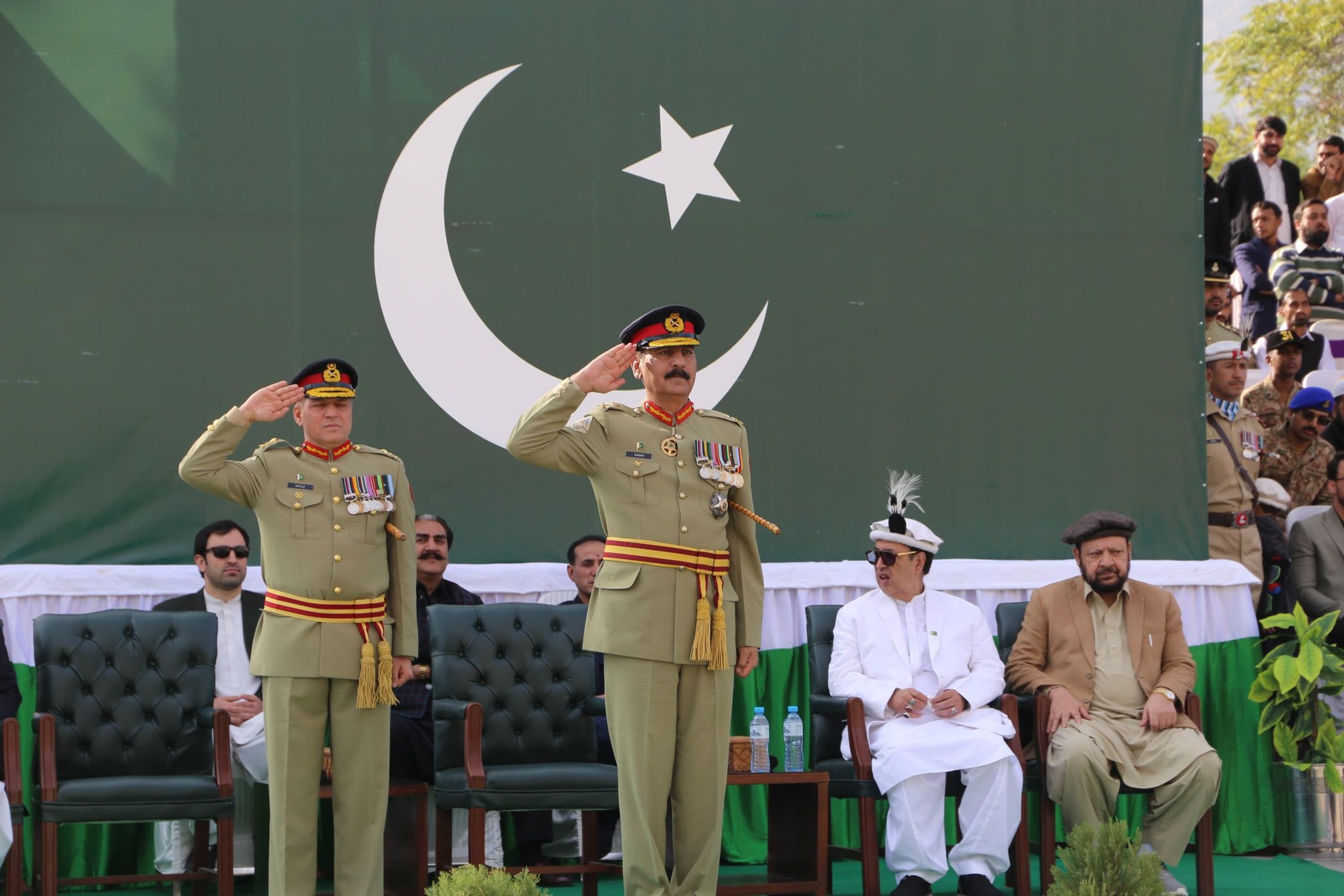
Gilgit-Baltistan enthusiastically celebrated its 77th Liberation Day on November 1st, 2024. A public holiday was declared in all ten districts, and various events were organized to commemorate the occasion.
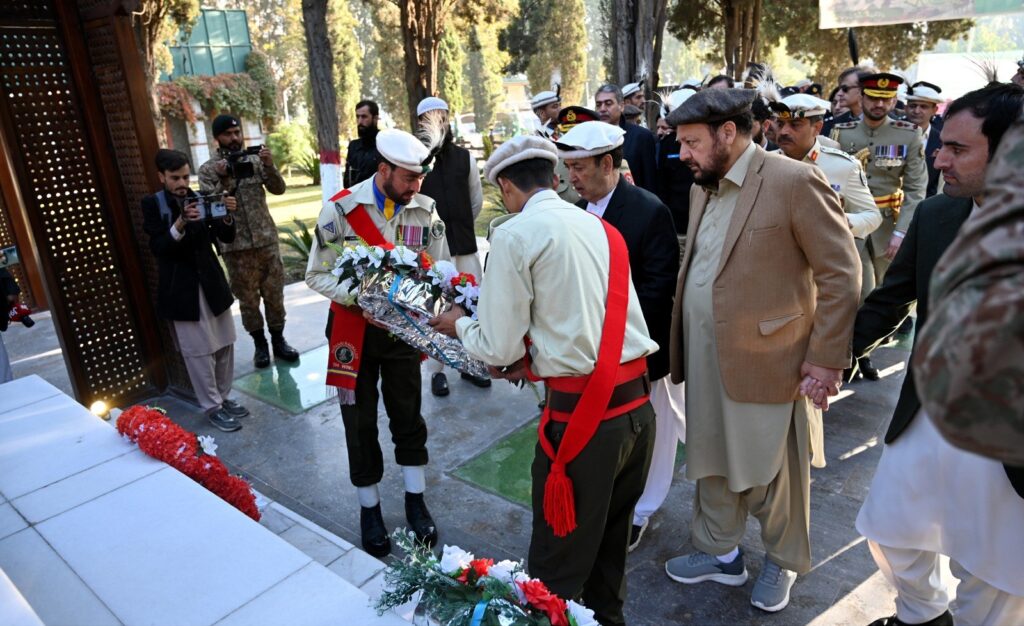
The main event was held at Yadgar Shuhada Chinar Bagh, where Governor Syed Mehdi Shah, Chief Minister Haji Gulbar Khan, and Commander FCNA Major General Syed Imtiaz Hussain Gilani unfurled the national flag. Provincial ministers, the Chief Secretary, the IG Police, and other senior officials also attended the ceremony. Floral tributes were paid to the martyrs, and the armed forces of the GB Police presented a salute.
Governor Syed Mehdi Shah emphasized the sacrifices made by the Gilgit-Baltistan Scouts, the region’s forefathers to liberate it from Dogra rule. He also acknowledged the sacrifices of the martyrs and reaffirmed the commitment to national security.
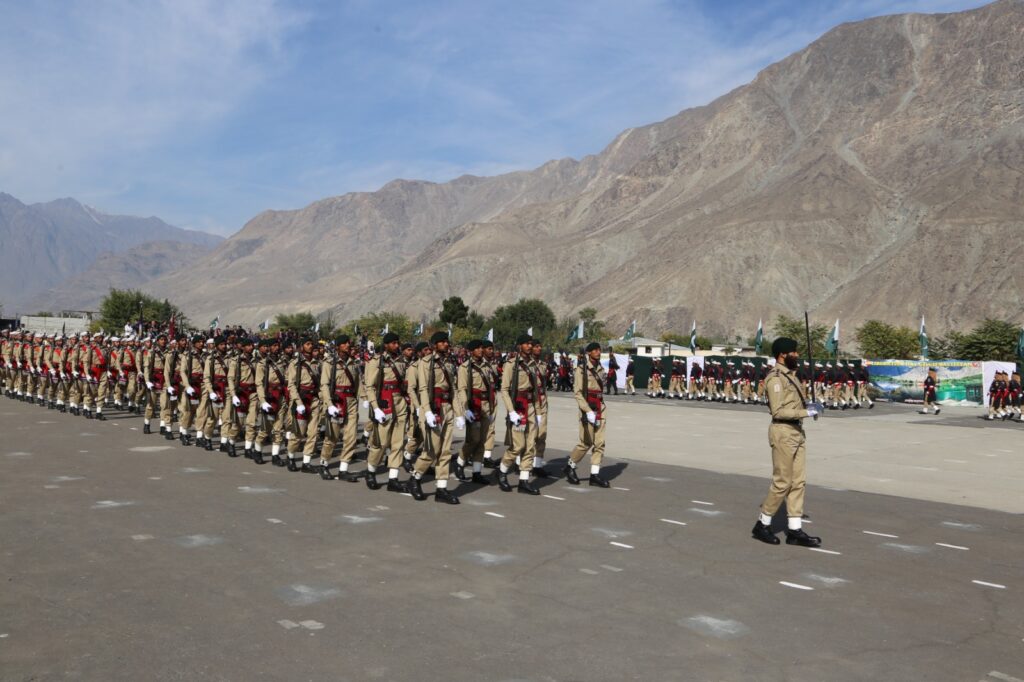
A special Independence Day ceremony was organized at the Army Helipad, where high-ranking civil and military officials participated. For the first time in Gilgit-Baltistan’s history, the 77th Independence Day Parade was telecast live on national channels, including Gilgit-Baltistan PTV. Many people viewed the parade live at Wahab Shaheed Ground and Lalak Jan Shaheed Ground.
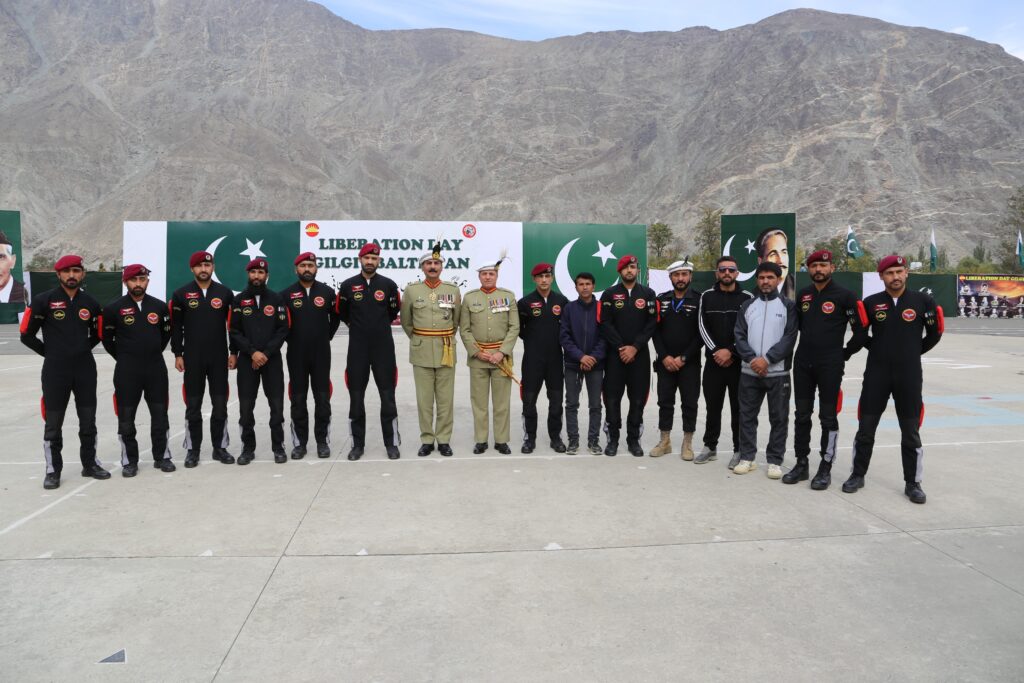
Commander 10 Corps Lieutenant General Shahid Imtiaz highlighted the significance of Gilgit-Baltistan’s freedom, achieved through the courage and sacrifice of its people. He emphasized the region’s enduring loyalty to Pakistan.

Chief Minister Haji Gulbar Khan paid tribute to the region’s martyrs and expressed pride in the people of Gilgit-Baltistan. He also acknowledged the pivotal role played by the Gilgit-Baltistan Scouts, a force with a rich history dating back to the British Raj. Their courage and sacrifice were instrumental in securing the region’s freedom from Dogra rule. Alongside the local populace, the Scouts fought valiantly against the Dogra forces and ultimately achieved victory.
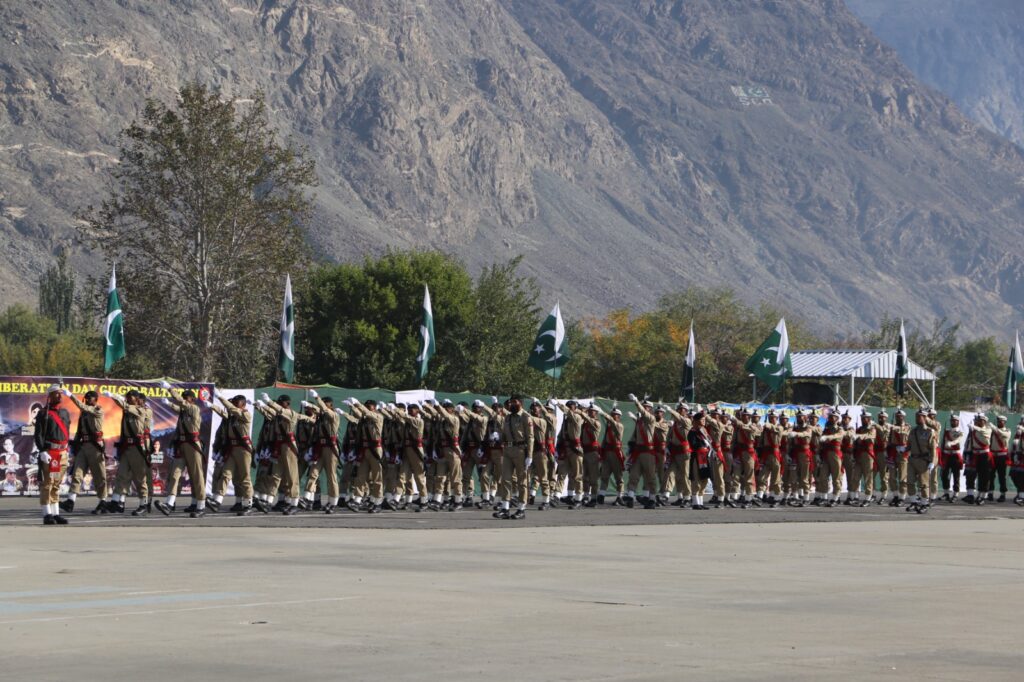
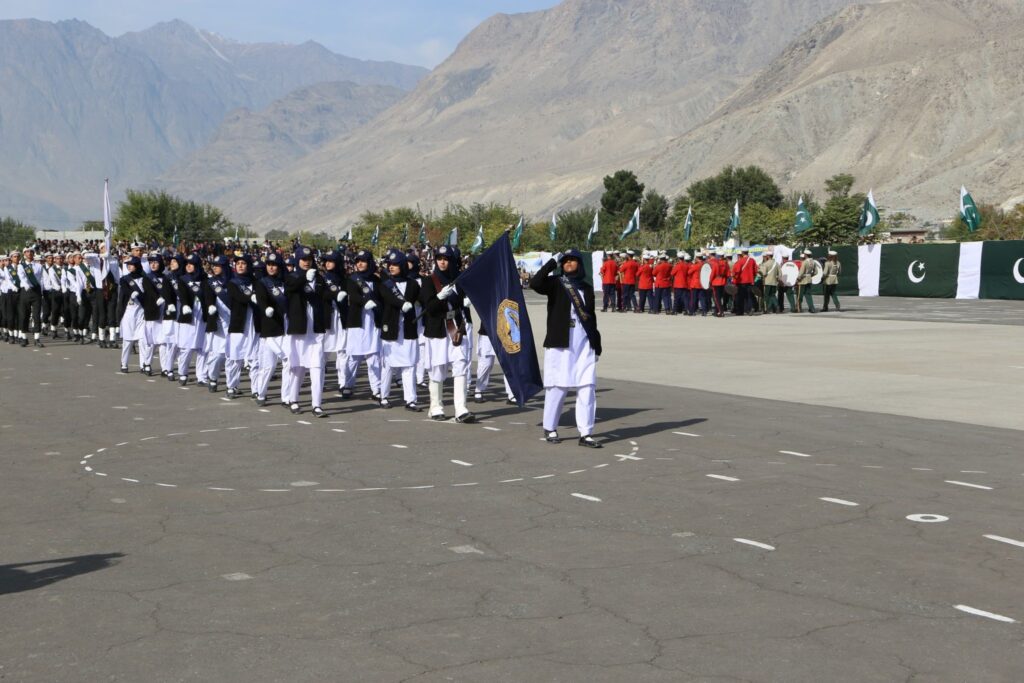
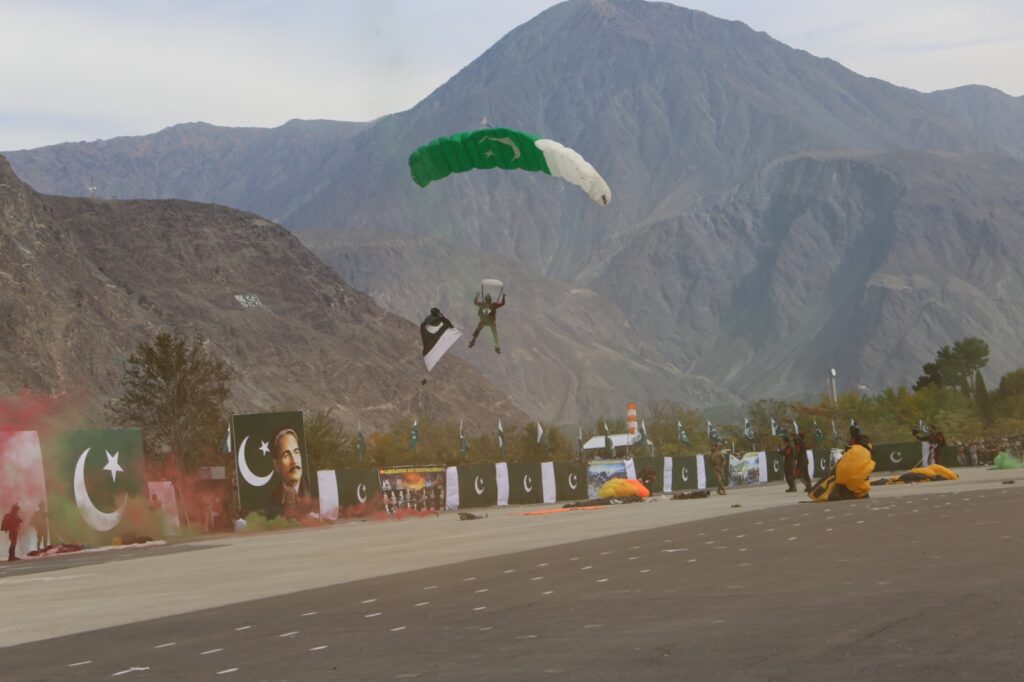
The Independence Day Parade featured troops from the NLI Center, GB Scouts, Women Police, GB Police, Punjab Rangers, Cadet College Skardu, and Cadet College Chilas. The celebrations also included paragliding performances and cultural programs, featuring national and regional patriotic songs as well as local dances.
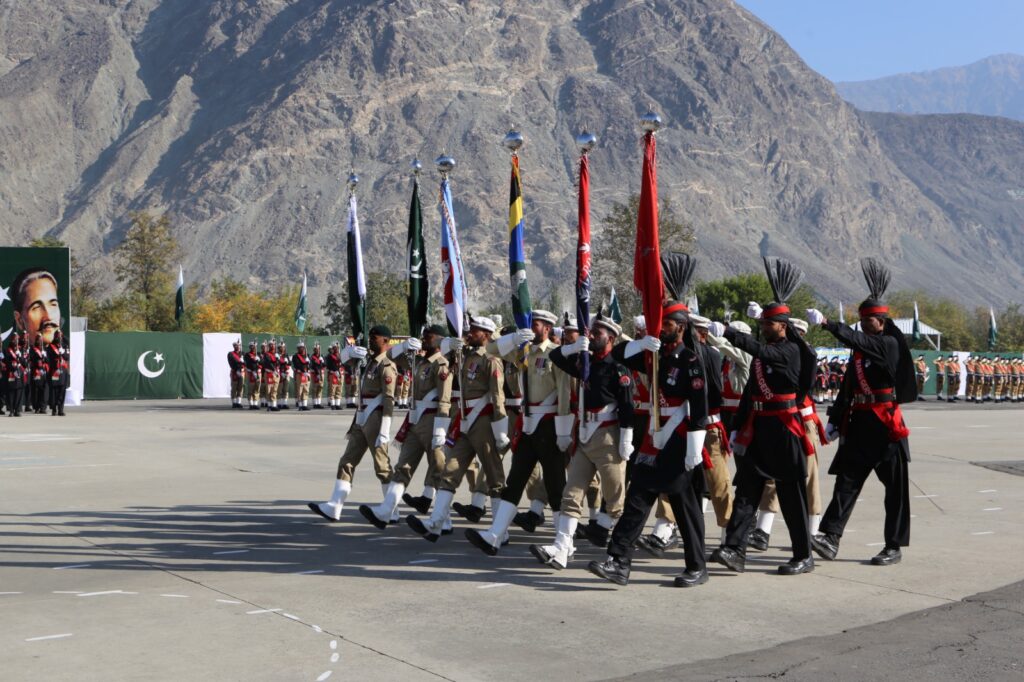
Similar celebrations were held in all districts of Gilgit-Baltistan, with cultural programs, flag hoisting ceremonies, and tributes to martyrs. The Pakistan Army played a significant role in organizing these events and broadcasting special programs.

As Gilgit-Baltistan commemorates its 77th Liberation Day, it reaffirms its commitment to national unity and prosperity. The region’s rich history, diverse culture, and stunning natural beauty continue to attract visitors from around the world. With its strategic location and abundant resources, Gilgit-Baltistan is poised to play a vital role in Pakistan’s development and progress.
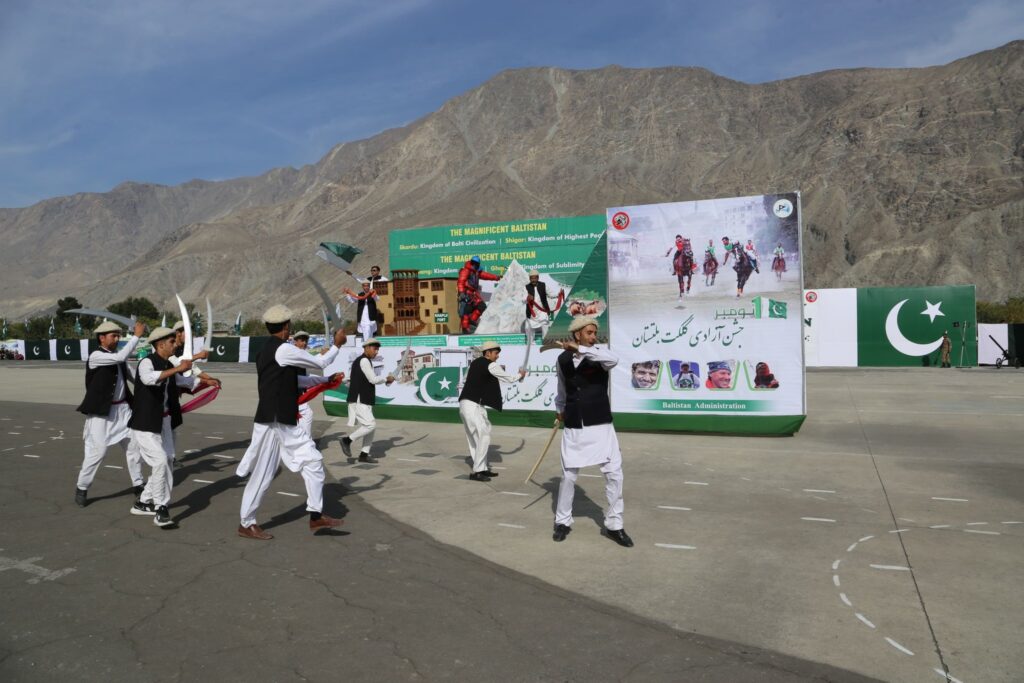
About Author
Imran Ali
The writer is the Founder & CEO of The Karakoram Magazine. Additionally, he is a nuclear scholar fellow at the Centre for Security Strategy and Policy Research (CSSPR) and can be reached at aleee.imran@gmail.com.

Muhammad Azeem Khan: Pakistan’s Number One Amateur Featherweight MMA Fighter

A Drop for a Click: The Silent Cost of Our Digital Thirst

10 Places to Visit in Hunza – Stunning Natural Wonders You Can’t Miss
Latest
-

 Tourism3 years ago
Tourism3 years ago15 Best Places to Visit in Skardu
-

 Arts, Culture & Heritage2 years ago
Arts, Culture & Heritage2 years agoTraditional women’s dresses of Gilgit-Baltistan
-

 KIU Corner2 years ago
KIU Corner2 years agoA Guide to LMS KIU Student Login – KIU
-
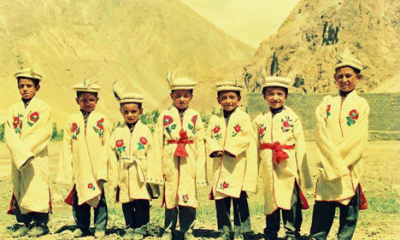
 Arts, Culture & Heritage2 years ago
Arts, Culture & Heritage2 years agoShuqa Simple but amazing winter clothing of Gilgit-Baltistan
-

 KIU Corner2 years ago
KIU Corner2 years agoEmbracing Challenges: Gul Rukhsar’s Remarkable Journey
-

 Arts, Culture & Heritage3 years ago
Arts, Culture & Heritage3 years agoQuroot: A Nutritious and Flavorful Staple of Gilgit-Baltistan’s Cuisine
-
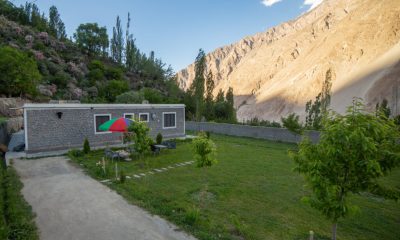
 Arts, Culture & Heritage2 years ago
Arts, Culture & Heritage2 years agoTraditional houses Gilgit-Baltistan
-
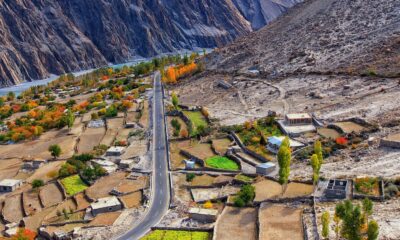
 Tourism2 years ago
Tourism2 years agoDiscover the Unparalleled Beauty and Culture of Gilgit-Baltistan



